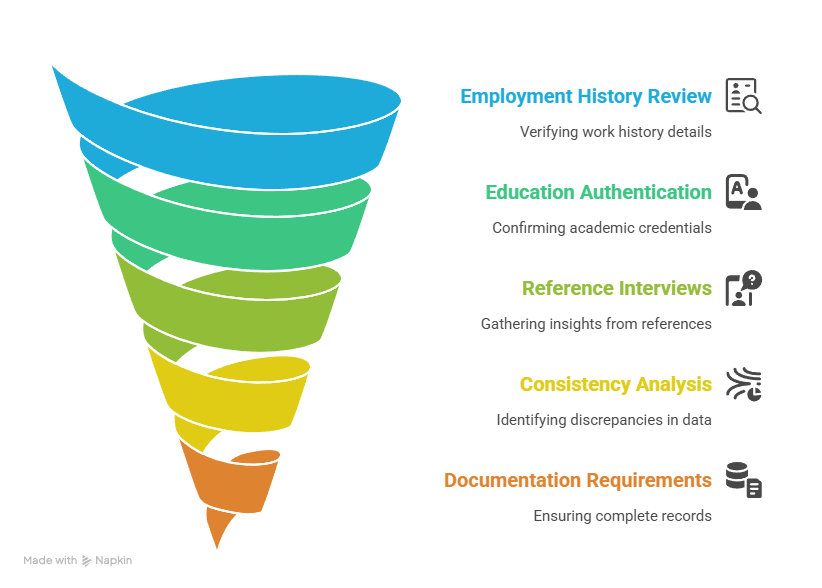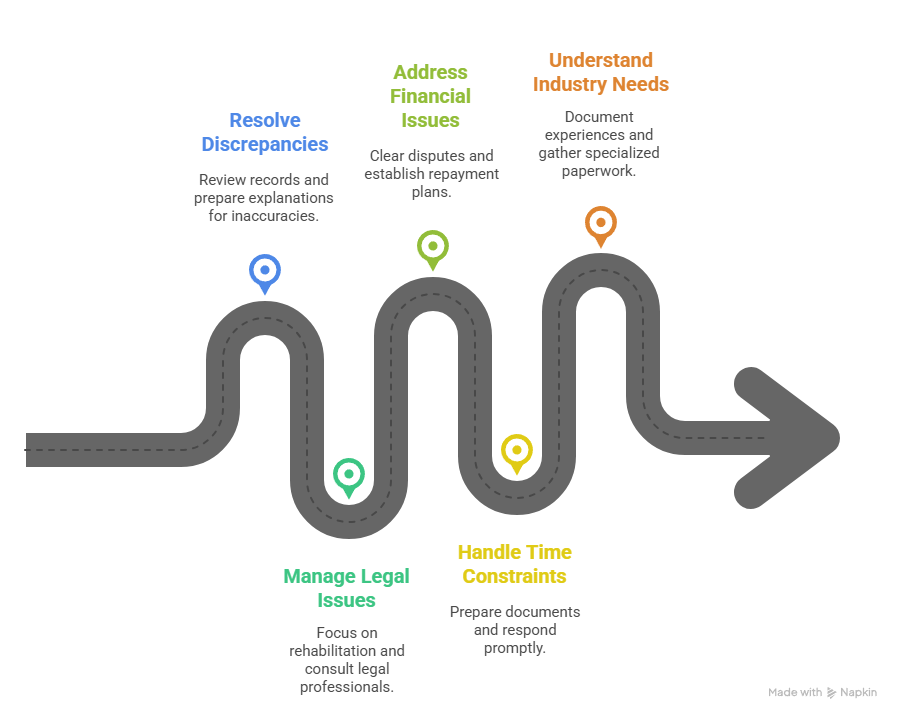Oklahoma's aerospace and defense industry requires comprehensive background checks that navigate both federal DoD NISPOM security clearance requirements and state Quality Jobs Act compliance standards. This guide provides essential insights for job seekers, employers, and staffing agencies to successfully manage the complex screening process that can range from 1-3 weeks for standard employment checks to 6-18 months for security clearances.
Key Takeaways
- Expect background checks for aerospace jobs in Oklahoma to last between one week to 18 months, depending on security clearance requirements.
- Major disqualifiers for these jobs include serious criminal records, financial instability, or dishonesty during the background screening.
- Non-sensitive roles often allow employment while security clearance is pending, but check specific job requirements with your employer.
- Background checks for standard roles range from $100 to $500, while advanced security clearance checks can cost thousands, mostly funded by the employer.
- You can appeal a denied security clearance, taking advantage of legal counsel and thorough documentation to build your case.

Oklahoma's dynamic aerospace and defense industry is a linchpin of its economy, supporting over 150,000 jobs and contributing billions annually. With industry giants like Boeing and pivotal installations such as Tinker Air Force Base, the sector's rigorous security protocols demand a comprehensive understanding of Oklahoma aerospace background check requirements. This guide is indispensable for job seekers, employers, and staffing agencies maneuvering through the multifaceted screening terrain, from the state's Quality Jobs Act to the federal DoD NISPOM regulations.
Understanding Oklahoma Aerospace Background Check Requirements
Federal vs. State Requirements
When it comes to aerospace background checks in Oklahoma, you're faced with both federal and state rules. The Department of Defense's NISPOM is your main guide for federal standards. This manual focuses on keeping sensitive information secure for contractors. It's a must-know if you're working on defense contracts.
On the state level, Oklahoma's laws, such as the Quality Jobs Act, come into play. This act ties benefits for companies to the creation of new, quality jobs, which means employers are required to conduct rigorous employee background checks. Theyâll examine things like consumer reports, ensuring thoroughness in hiring.
Balancing between these requirements can get tricky, especially if you're transitioning from civilian roles to military-influenced positions. If your background includes foreign ties or complex personal details, you'll need to be ready for deeper investigations.
Industry-Specific Screening Components
Standard background checks cover criminal records, prior employment, and education. But aerospace goes several steps further. It includes checking eligibility for security clearances, any foreign contacts, and the specific skills you're claiming. Companies like Boeing and Northrop Grumman don't take this lightly, often leading to prolonged evaluations, especially for positions tied to national security.
Keeping detailed and accurate records is not just a good ideaâit's critical. Whether you're a job seeker or an employer navigating this landscape, understanding the dual facets of federal and state requirements will simplify the background check process and broaden opportunities within Oklahoma's aerospace sector.
Oklahoma Quality Jobs Act and Background Screening
Quality Jobs Act Provisions
The Oklahoma Quality Jobs Act encourages companies to grow their operations by offering incentives, provided they comply with specific workforce requirements. This compliance directly impacts the intricacies of background checks. Businesses participating in this program need to maintain accurate and detailed employee verification records. They also must adhere to federal security standards as a condition under the Act.
Employment under the Quality Jobs Act involves verifying work authorization, skill credentials, and eligibility for security clearance. This requires significant documentation and continuous monitoring, not just from the employers but also from the employees themselves.
Employment Verification Requirements

In Oklahoma's aerospace industry, employment verification is a critical step. This thorough process ensures a candidate's past work experience aligns with their resume claims, a necessity for roles requiring security clearance. Employers verify employment history for accuracy, often going back ten years. They confirm job titles, duration, and reasons for leaving past employment. Inconsistencies can raise red flags, potentially delaying or blocking job opportunities.
When it comes to education, aerospace companies are equally diligent. Degrees and certifications are checked for authenticity. This step is crucial since technical roles often depend on specialized skills and knowledge.
References play a significant role. Employers contact former supervisors or colleagues to gauge work ethic, reliability, and professional behavior. Positive references bolster a candidate's profile, while negative insights could prompt further investigation.
Are your resume and references ready for scrutiny? Being honest about your professional history can save time and prevent future complications. Falsifying details might appear tempting but can have severe career consequences. Remember, a transparent application strengthens your candidacy in Oklahoma's robust aerospace industry.
DoD NISPOM Compliance Requirements
Security Clearance Levels
The DoD NISPOM delineates three security clearance levels: Confidential, Secret, and Top Secret. These are essential for aerospace workers handling sensitive data. As the clearance level rises, so does the intensity of the background investigation:
| Level | Description |
|---|---|
| Confidential Clearance | Requires a National Agency Check with Local Agency and Credit Check (NACLC), typically covering seven years. |
| Secret Clearance | Involves a Single Scope Background Investigation (SSBI) covering the past ten years. |
| Top Secret Clearance | Necessitates an Enhanced Single Scope Background Investigation (ESSBI), going back 10 to 15 years. |
These distinct levels serve a critical functionâensuring that individuals with access to classified information are thoroughly vetted.
Investigation Process Overview
The Defense Counterintelligence and Security Agency (DCSA) manages the clearance process, beginning with the Standard Form 86 (SF-86). This form is a comprehensive dossier of the applicant's personal history. The process unfolds in several steps:
Initial Screening: DCSA personnel carefully review the SF-86 for accuracy and completeness. Any inconsistencies can slow down the process, so accuracy is crucial.
Records Review: This phase involves a deep check into educational, employment, and criminal records. The goal is to verify the information provided and uncover any omissions.
Field Investigation: Investigators reach out to personal and professional contacts. They conduct interviews to assess character and integrity. This can provide insights beyond what is documented.
Specialized Investigations: If any areas of concern are identified, more targeted investigations occur. This may involve financial reviews or examining foreign contacts.
Adjudication: The final step involves evaluating all gathered information to decide on granting clearance. This decision balances potential risks against national security needs.
Each phase is essential in ensuring candidates meet the stringent standards required for handling sensitive information. Staying truthful and organized can help streamline this extensive process.
Ongoing Monitoring and Reinvestigation
Maintaining security clearance is not a one-time process; it involves periodic reinvestigations and continuous monitoring. Depending on the clearance level, these can occur every 5 to 15 years. This ongoing scrutiny helps catch emerging issues, such as legal problems or financial stresses, that might affect an individual's eligibility.
You must ensure your information remains current and accurate to avoid potential setbacks. Being proactive about updating changes in your situation helps maintain the integrity of your clearance status. Remaining vigilant will protect your career in this highly sensitive and regulated sphere.
Oklahoma Criminal History and Background Checks
OSBI Criminal History Records

The Oklahoma State Bureau of Investigation (OSBI) maintains criminal history records that are essential in conducting background checks for the aerospace sector. This includes both name-based and fingerprint-based searches. Name-based checks are quicker and more accessible but may lack the precision of fingerprint-based checks, which law enforcement agencies prefer for thorough verification.
For high-security roles, precision is critical. Fingerprint-based checks align closely with federal screening protocols, such as those required for security clearances. They provide a detailed history that can reveal any past disqualifying offenses like felonies or misdemeanors, which are vital to consider when assessing a candidateâs eligibility for sensitive aerospace positions.
Employers and staffing agencies often require regular access to OSBI records to ensure compliance with both state and federal mandates. These checks serve as a filter to enhance the integrity and security of the workforce, particularly in a sector so deeply intertwined with national security interests. Are you ensuring your processes align with these standards for the roles youâre interested in or hiring for?
Oklahoma Clean Slate Act Impact and Disqualifying Offenses
The Clean Slate Act allows for the sealing of certain criminal records in Oklahoma, potentially influencing background checks. However, itâs important to note that federal security evaluations, such as those required for Department of Defense clearances, can still access sealed records. This highlights the need for transparency when disclosing past offenses. Disqualifying crimes in aerospace can include espionage, terrorism, significant financial crimes, and acts of violence. However, demonstrating rehabilitation and being honest about previous issues can lessen their impact. It's important to understand how your history might intersect with these strict industry standards. How might your past affect your eligibility for these roles?
Financial and Credit Requirements

Security Clearance Financial Standards
Your financial history plays a crucial role in obtaining a security clearance. Financial stability helps assess your reliability and integrity, which are vital for roles involving sensitive information. Background checks examine your credit history, outstanding debts, tax compliance, and any foreign financial interests. The aim is to identify potential vulnerabilities that could compromise national security.
Being thorough in preparing financial documents can make a difference. Ensure all your taxes are up-to-date, and resolve any outstanding debts. Consistent payment history indicates responsibility, which is a positive signal to investigators. Transparency is also essential. Disclose any past financial issues, like defaults or bankruptcies, during the initial clearance application to avoid complications later.
Addressing financial disqualifiers involves taking proactive steps. These might include participating in debt counseling or setting up payment plans for any arrears. Demonstrating progress in managing debts shows effort towards financial rectification. Itâs not just about having a clean financial recordâit's about showing you can manage financial risks effectively.
Consider your financial standing before applying for positions requiring security clearance. By addressing potential financial red flags early, you save time during the clearance process. This proactive approach might also shield you from unnecessary stress and delays, allowing you to focus on your career in the aerospace industry.
Common Financial Disqualifiers
Being in debt, filing for bankruptcy, or having unpaid taxes can derail your security clearance application. These aren't necessarily deal-breakers, but they require proactive management. Demonstrating that you're addressing these issues helps. Paying off debts, enrolling in debt counseling, or setting up payment plans for taxes can show you're taking responsibility. When under evaluation, transparency is your best defense. Prepare to explain any financial hitches with honest and clear documentation. Your aim should be to show you manage your finances responsibly, reducing any perceived security risk.
Employment History and Reference Verification
Verifying employment history and collecting reference feedback are central to the background check process. Employers often contact previous employers directly to confirm dates of employment, positions held, and reasons for leaving. This step verifies the accuracy of the information you provide and gives employers insights into your work habits and reliability.
When employers conduct reference interviews, they delve into your professional conduct, ability to meet deadlines, and cooperation with team members. These conversations help gauge your potential fit within the company culture and specific job role. A positive reference can strengthen your application, while inconsistencies or negative feedback might raise concerns.
To prevent issues, prepare by reaching out to former supervisors or colleagues in advance. Make sure they are willing to speak positively about your performance. Discrepancies in your employment history, such as unexplained gaps or unverified roles, can be red flags. To mitigate this, offer a detailed explanation of any anomalies with supporting documentation.
Facing obstacles in employment verification doesn't mean it's the end of the road. Anticipate questions or concerns and come prepared with clear explanations and evidence to support your case. Being transparent and organized can significantly improve your chances of moving forward in the hiring process.
Are you confident about your employment history? Double-check your records now to ensure your next application is bulletproof.

Academic and Professional Certification Verification
In the aerospace industry, verifying academic credentials and professional certifications is crucial. Employers need assurance that the skills and knowledge claimed by candidates match what is required for highly technical roles. This verification process often involves contacting educational institutions to confirm degrees and checking with certifying bodies for licenses or certifications.
For example, if you claim a degree in aerospace engineering from a particular university, the employer checks with that institution to confirm your attendance, graduation date, and degree. Similarly, if you're a certified A&P (Airframe & Powerplant) mechanic, the employer might verify this certification with the Federal Aviation Administration (FAA) to ensure itâs current and valid.
Discrepancies in educational claims can sway hiring decisions. For instance, if your degree or certification doesn't match what's on your résumé, it raises questions about your integrity and qualifications. This could lead to missed job opportunities in roles demanding precision and trust. Maintaining accurate documentation and providing consistent information across applications, résumés, and interviews is key. By ensuring all of your educational and professional details are truthful and up-to-date, you help fast-track the verification process and bolster your credibility as a candidate.
How prepared are your credentials for such screenings? Regularly updating your records and promptly addressing potential inaccuracies can save time and remove barriers in your job search within Oklahoma's aerospace sector.
Timeline and Process Management
Background checks in the aerospace industry are thorough, with processing times varying significantly. Employment checks usually take between 1 and 3 weeks. Security clearance investigations can be more demanding, stretching from 6 months to a possible 18 months, depending on the complexity of the applicant's background.
To navigate through this effectively, accurate and proactive application submissions are critical. Being meticulous from the start can prevent delays. For example, ensure all documents are complete and up-to-date before submitting them. If you have lived or worked abroad, the verification process might take longer due to the need for extensive international records checks. The best practice here is to provide as much information upfront as possible.
Responsive communication with investigators can also ease the process. When you're prompt in answering inquiries or requests for additional information, you're less likely to face bottlenecks. Financial issues, such as tax irregularities or unresolved debt, can introduce complications, so addressing these proactively can be beneficial.
Ultimately, understanding these timelines and potential hurdles allows you to better prepare for the duration and depth of aerospace industry background checks.
Common Challenges and Solutions
Navigating background checks can be daunting. However, with a strategic approach, you can significantly smoothen this process. Let's tackle common hurdles and explore solutions.

Resolving Discrepancies
Discrepancies in your background check might seem minor, but they can impact your prospects. These are often errors in employment dates, job titles, or education credentials. Catching these before a potential employer does is crucial. To address this, review your records carefully. Consider requesting a personal background check to spot any inaccuracies in advance. If discrepancies exist, prepare a clear, honest explanation and present additional documentation if necessary to support your claims.
Managing Legal Entanglements
A brush with the law doesnât automatically disqualify you from aerospace and defense roles. If you have a criminal record, focus on any rehabilitation efforts, community service, or completed programs that demonstrate positive change. Engage with local legal professionals if unclear about how your record might affect your job opportunities. Familiarize yourself with the Fair Credit Reporting Act, ensuring background checks are fair, accurate, and handled legally.
Addressing Financial Issues
Financial instability can trigger red flags, especially for security clearance. Debt, bankruptcies, or delinquent taxes are particular concerns. Start by clearing up any disputes on your credit report and setting up repayment plans with creditors. Demonstrating a sincere effort to manage finances responsibly helps in clearance assessments. If needed, financial counseling can offer support and help craft a recovery plan.
Handling Time-Consuming Processes
The length of background checks can be frustrating. Employment checks generally take a few weeks, while security clearances stretch much longer. Being proactive speeds things up. Ready all necessary documents and respond promptly to any requests for additional information. For roles requiring security clearance, accurately fill out the SF-86 form and supply detailed data on personal history and affiliations to avoid potential delays or backtracking.
Understanding Industry-Specific Requirements
Every industry has its demands. For example, aerospace checks necessitate extra screenings for international contacts or foreign travel. Itâs helpful to clearly document these experiences, emphasizing transparency. In scenarios involving specialized defense positions, expect in-depth evaluations around security risks, so begin gathering related paperwork well ahead of time.
By anticipating these common challenges and taking decisive steps towards resolution, you can effectively manage any issues in your background check process.
Commercial Aviation vs. Defense Contracting and Specialized Positions
When diving into aerospace roles in Oklahoma, understanding the distinction between commercial aviation and defense contracting screenings is crucial. Each sector follows different regulatory frameworks that directly impact background check requirements and timelines.
| Aspect | Commercial Aviation | Defense Contracting |
|---|---|---|
| Primary Regulations | FAA regulations | DoD NISPOM standards |
| Focus Areas | Pilot licenses, flight records, medical fitness | Security clearances, classified information access |
| Standard Checks | Employment history, criminal records, drug screening | Financial background, foreign contacts, extensive personal history |
| Clearance Levels | Basic aviation certifications | Confidential, Secret, Top Secret |
| Timeline | More streamlined process | Extended, multi-level scrutiny |
| Documentation Required | Aviation credentials, medical records | U.S. citizenship proof, technical certifications, comprehensive personal history |
Roles intersecting with sensitive defense projects require enhanced evaluations beyond standard requirements. Cybersecurity positions safeguarding critical infrastructures and engineering roles in missile systems demand rigorous credential authentication and impeccable record verification.
Proper preparation with organized documentation not only streamlines the hiring process but demonstrates your readiness for high-stakes industry roles. Understanding these distinctions allows you to tailor your application materials and anticipate employer expectations effectively.
Best Practices for Oklahoma Aerospace Workers
- Plan Ahead: Clearance processes can be lengthy. Start early to avoid delays.
- Maintain Honesty: Transparency is crucial. Always disclose complete, truthful information during security checks.
- Document Thoroughly: Keep accurate records of your employment, education, and personal history. This facilitates smoother background checks.
- Know Your Rights: Understand your legal protections under the Fair Credit Reporting Act to ensure you're treated fairly during checks.
- Seek Guidance: Consult legal or professional advisors if you encounter complex background issues. Their expertise can help you navigate challenges effectively.
These steps can help you meet the rising demands and secure a successful career in Oklahoma's aerospace industry.
Conclusion
Oklahoma's aerospace and defense sectors provide rich opportunities for those who come prepared. Navigating the intricate regulatory framework can be challenging yet rewarding. Understanding the requirements of the Quality Jobs Act and DoD NISPOM is crucial for anyone looking to build a career in this field. By equipping yourself with this guideâs insights, you can better manage the complex landscape of background checks. This preparation not only aids your career but also supports Oklahomaâs aerospace innovation and security.
Frequently Asked Questions
How long does an Oklahoma aerospace background check take?
For standard employment checks, expect a timeframe of 1-3 weeks. If you're applying for a position that requires security clearance, the process could extend from 6 to 18 months. Delays often occur due to the depth of investigation required, so it's important to be patient and prepare accordingly.
What are disqualifying factors for Oklahoma aerospace employment?
Factors that may disqualify you include serious legal issues like felony convictions, financial instability such as significant unpaid debts or bankruptcies, and any incidents that call into question your honesty or integrity during evaluations. Transparency and proactive management of these issues can often lead to favorable outcomes.
Can I work while my security clearance is pending?
In many cases, yes, you can work in non-sensitive roles while awaiting clearance. However, this depends on the specific requirements of the position and employer. Clearance-dependent positions usually require you to wait until the process is complete.
How much does an aerospace background check cost?
The costs vary widely. For standard employment checks, expect to pay between $100 and $500. For security clearances, especially those at higher levels, costs can rise to several thousand dollars. It's often discussed and arranged through your employer or the contracting entity.
Is it possible to appeal denials of security clearance?
Absolutely. If your security clearance is denied, you have the right to appeal. This process often involves detailed documentation and potentially a hearing. Being thorough in your documentation and seeking legal counsel can help strengthen your appeal.
Do all aerospace jobs require security clearance?
Not all aerospace jobs require a security clearance. However, if you are involved in defense contracting or positions handling sensitive information, clearance is commonly needed. It's best to verify specific job requirements with potential employers.
How long does it take for a background check in Oklahoma?
Most background checks in Oklahoma can take anywhere from one to three business days. However, this can vary based on the type of check and specific agencies involved.
What kind of background check do US airport employees have to have?
US airport employees must undergo comprehensive background checks, including fingerprinting, criminal history records, and employment verification. These checks are critical for security clearance.
Does Oklahoma have background checks for guns?
Yes, Oklahoma requires background checks for firearm purchases from licensed dealers. Private sales may not have the same requirements.
How far back do most employers go for background checks?
Employers typically look at the last seven years of an applicant's history. This can vary based on the position and industry policies.
Additional Resources
- WSOM-01-2025: Requirements for Conducting and Documenting Pre-Employment Background Checks
https://oklahoma.gov/content/dam/ok/en/workforce/documents/policies/memos/2025/WSOM-01-2025-Requirements-for-Conducting-and-Documenting-Pre-Employment-Background-Checks.pdf - 32 CFR Part 117: National Industrial Security Program Operating Manual (NISPOM)
https://www.ecfr.gov/current/title-32/subtitle-A/chapter-I/subchapter-F/part-117 - Oklahoma Quality Jobs Program â Incentives & Programs
https://www.okcommerce.gov/doing-business/incentives-programs/quality-jobs-program/

GCheck Editorial Team
Meet the GCheck Editorial Team, your trusted source for insightful and up-to-date information in the world of employment background checks. Committed to delivering the latest trends, best practices, and industry insights, our team is dedicated to keeping you informed.
With a passion for ensuring accuracy, compliance, and efficiency in background screening, we are your go-to experts in the field. Stay tuned for our comprehensive articles, guides, and analysis, designed to empower businesses and individuals with the knowledge they need to make informed decisions.
At GCheck, we're here to guide you through the complexities of background checks, every step of the way.





